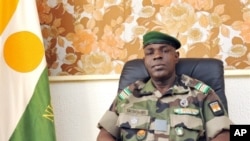Niger's military rulers have a new consultative council to help plan elections meant to return to constitutional order.
Niger's new consultative council has 131 members drawn from civil society groups, political parties, trade unions, and members of defense and security forces. It is lead by opposition politician Marou Amadou.
Military leader Commandant Salou Djibo says the council is a transitional authority meant to help restore democratic rule following February's coup against President Mamadou Tandja.
Mr. Djibo says the consultative council will help the ruling military Supreme Council for the Restoration of Democracy consider changes to a constitution passed by President Tandja last year that expanded his powers and extended his rule.
Mr. Djibo says those changes may include the electoral code, the charter for political parties, the status of the opposition, and access to public information. He says the consultative council will help put in place an independent electoral commission and a means of public finance for candidates as well as determining the length of this transition to civilian rule.
Mr. Djibo says all members of defense and security forces, the prime minister, and members of the transitional government are ineligible to run in the elections organized by this consultative council.
Regional diplomats say they believe Niger's military rulers are serious about returning to civilian rule, in part, because many of these men played key roles in a 1999 coup that lasted less than one year before organizing elections.
The military this week freed 14 allies of President Tandja detained for questioning in connection with what soldiers say were subversive activities meant to undermine the government. The military says there will be no impunity for crimes by the previous government, and former ministers now released will remain under constant surveillance.
Mr. Djibo says Niger's defense and security forces will never relinquish their responsibility to guard against anyone who threatens national unity or the independence and sovereignty of the nation. He says the new consultative council will preside over the defense of human rights in Niger until a new government is elected.




